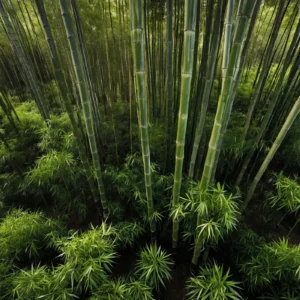Bamboo, a fast-growing and versatile giant grass, has been a cornerstone of human civilization for millennia. From humble beginnings in construction and tools, bamboo’s potential is exploding thanks to cutting-edge technologies. This surge in innovation is unlocking a new era of sustainable applications, making bamboo a key player in building a greener future.
Why Bamboo? A Sustainable Powerhouse
Bamboo’s unique properties make it an ideal candidate for sustainable innovation:
- Rapid Growth: Unlike trees that take decades to mature, bamboo boasts phenomenal growth rates, reaching harvestable size in just 3-5 years. This rapid regeneration makes it a highly renewable resource.
- Strong and Flexible: Bamboo possesses a remarkable strength-to-weight ratio, comparable to steel in tension and boasting impressive flexibility. This combination makes it suitable for various structural and construction applications.
- Eco-Friendly: Bamboo cultivation requires minimal water and thrives without pesticides or fertilizers. Its extensive root system helps prevent soil erosion and promotes land health.
- Biodegradable: Being naturally organic, bamboo products decompose readily, minimizing landfill waste compared to non-biodegradable materials.
Bamboo Innovations: A Glimpse into the Future
Let’s delve into some of the exciting technological advancements pushing the boundaries of bamboo’s capabilities:
- Construction Revolution: Bamboo is no longer limited to traditional huts. Advanced processing techniques like lamination are creating high-strength bamboo composites. These composites are being used for building earthquake-resistant structures, bridges, and even furniture.
- Bio-Composites: Researchers are developing innovative bio-composites by combining bamboo fibers with other natural materials like resin or bioplastics. These composites offer a sustainable alternative to traditional materials used in construction, flooring, and automotive parts.
- Textile Transformation: Bamboo fibers are being woven into luxurious fabrics known for their breathability, softness, and natural anti-bacterial properties. These eco-friendly textiles are gaining traction in the fashion industry, offering a sustainable alternative to conventional cotton and synthetic fabrics.
Beyond the Obvious: Unveiling Unexpected Applications
The world of bamboo innovation extends far beyond construction and textiles. Here are some groundbreaking applications on the horizon:
- Bamboo Bioenergy: Through processes like gasification, bamboo can be converted into clean-burning biofuels. This renewable energy source can potentially replace fossil fuels and reduce greenhouse gas emissions.
- Biochar for Soil Health: Pyrolysis, a thermochemical process, transforms bamboo into biochar, a charcoal-like substance. Biochar improves soil fertility by retaining moisture and nutrients, making it a valuable tool for sustainable agriculture.
- Air and Water Purification: Bamboo’s natural filtering properties are being harnessed for air and water purification systems. Bamboo charcoal can be used in air filters to remove pollutants, while its dense root network helps filter water naturally.
The Road Ahead: Challenges and Opportunities
Despite the exciting advancements, there are challenges to overcome:
- Standardization: Standardizing processing techniques and product quality remains a work in progress. This is crucial for ensuring the consistent performance of bamboo-based products.
- Public Perception: Bamboo is often associated with traditional uses. Raising awareness about its modern capabilities and promoting its eco-friendly benefits are essential.
- Sustainable Practices: Ensuring responsible cultivation and harvesting practices are critical to maintain bamboo’s environmental benefits.
Embracing a Greener Future with Bamboo
The potential of bamboo innovation is undeniable. By overcoming challenges and fostering collaboration between researchers, engineers, and entrepreneurs, we can unlock a future where bamboo plays a vital role in sustainable development. From building eco-friendly homes to creating innovative bio-products, bamboo offers a pathway to a greener future.





